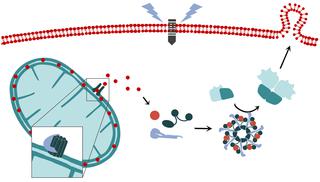PLOS ONE ( IF 3.7 ) Pub Date : 2018-09-19 , DOI: 10.1371/journal.pone.0203991 Stephanie A. Luff , Chen-Yuan Kao , Eleftherios T. Papoutsakis

|
Megakaryocytes (Mks) derive from hematopoietic stem and progenitor cells (HSPCs) in the bone marrow and develop into large, polyploid cells that eventually give rise to platelets. As Mks mature, they migrate from the bone marrow niche into the vasculature, where they are exposed to shear forces from blood flow, releasing Mk particles (platelet-like particles (PLPs), pro/preplatelets (PPTs), and Mk microparticles (MkMPs)) into circulation. We have previously shown that transcription factor p53 is important in Mk maturation, and that physiological levels of shear promote Mk particle generation and platelet biogenesis. Here we examine the role of p53 in the Mk shear-stress response. We show that p53 is acetylated in response to shear in both immature and mature Mks, and that decreased expression of deacetylase HDAC1, and increased expression of the acetyltransferases p300 and PCAF might be responsible for these changes. We also examined the hypothesis that p53 might be involved in the shear-induced Caspase 3 activation, phosphatidylserine (PS) externalization, and increased biogenesis of PLPs, PPTs, and MkMPs. We show that p53 is involved in all these shear-induced processes. We show that in response to shear, acetyl-p53 binds Bax, cytochrome c is released from mitochondria, and Caspase 9 is activated. We also show that shear-stimulated Caspase 9 activation and Mk particle biogenesis depend on transcription-independent p53-induced apoptosis (TIPA), but PS externalization is not. This is the first report to show that shear flow stimulates TIPA and that Caspase 9 activation and Mk-particle biogenesis are directly modulated by TIPA.
中文翻译:

p53和转录独立的p53诱导的细胞凋亡在剪切刺激的巨核细胞成熟,颗粒生成和血小板生物发生中的作用
巨核细胞(Mks)来源于骨髓中的造血干细胞和祖细胞(HSPC),并发展成大型多倍体细胞,最终产生血小板。随着Mks的成熟,它们从骨髓生境迁移到脉管系统,在那里它们受到来自血流的剪切力的作用,释放出Mk颗粒(血小板样颗粒(PLP),pro / preplatelets(PPTs)和Mk微粒(MkMPs) ))进入循环。先前我们已经表明,转录因子p53在Mk成熟中很重要,并且生理水平的剪切促进Mk颗粒的产生和血小板的生物发生。在这里,我们研究了p53在Mk切应力响应中的作用。我们显示p53在未成熟Mks和成熟Mks中均响应剪切而被乙酰化,并且脱乙酰基酶HDAC1的表达降低,乙酰转移酶p300和PCAF的表达增加可能是这些变化的原因。我们还检查了p53可能参与剪切诱导的Caspase 3活化,磷脂酰丝氨酸(PS)外部化以及PLP,PPT和MkMP的增加的生物发生的假说。我们表明,p53参与所有这些剪切诱导的过程。我们显示,响应剪切,乙酰基p53结合Bax,细胞色素c从线粒体释放,并且胱天蛋白酶9被激活。我们还表明,剪切刺激的Caspase 9激活和Mk粒子的生物发生依赖于转录独立的p53诱导的凋亡(TIPA),但PS的外部化则不是。这是第一个显示剪切流刺激TIPA的报告,TIPA直接调节Caspase 9的活化和Mk颗粒的生物发生。



























 京公网安备 11010802027423号
京公网安备 11010802027423号